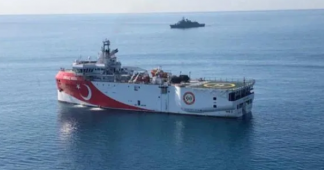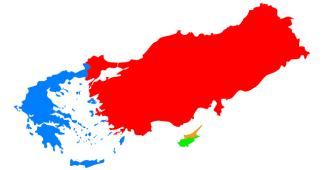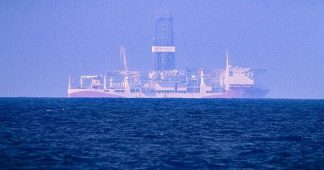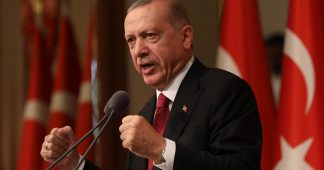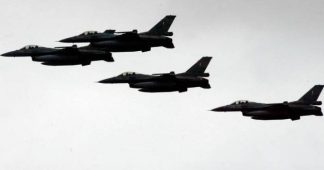Βy Dimitris Konstantakopoulos
In a previous article we discussed the decision of Ankara to turn Hagia Sophia into a mosque in the wider and changing strategic context of Eastern Mediterranean and of shifting Turkish politics.
This decision and also the outrageous Turkish – Libyan Memorandum on dividing maritime zones in Eastern Mediterranean, which does not recognize any rights to the Greek islands, are two policies which add fuel to an escalating crisis between Greece and Turkey, a crisis with the potential of bringing the two countries to war. Such a possibillity is already discernible in the event Turkey tries to make drills near the coasts of the Greek islands of Kastellorizo, Rhodes and Crete. The Greek government will be, in such a case, under enormous pressure to react militarily and, if it does not react, will risk to fall.
A war between Greece and Turkey may be desired by international centers of power in order, among other things, to curtail Turkish independence tendencies and to undermine Erdogan by pushing him to “overextension”. This is a classic method used with Saddam, with Milosevic and with the Greek CIA-imposed dictator Ioannides, who organized a coup d’ etat in Cyprus believing (and having assurances) he will unite it with Greece in 1974, only to see the Turkish army invade the island. The architect of all this operation, behind both the Greek and the Turkish side of the equation, was the criminal figure of Henry Kissinger, ancestor of the present – day Neocons, who is said to enjoy, even nowadays, a considerable influence on Donald Trump. We cannot exclude that such a method was used already in 2015, by imperial centers encouraging Turkey to shut down a Russian aircraft. This incident could have provoked a crisis between Russia and Turkey, leading to conflict between them, undermining Russian presence in the Middle East and Erdogan’s power in Ankara.
Important advisers to Mr Erdogan have repeatedly expressed fears that Greece and Cyprus have become “instruments” of the United States and Israel against Turkey. But in fact, with decisions such as those for drilling outside the Greek islands or for Hagia Sophia, it is the Turkish leadership itself which is strengthening in reality and providing arguments to the forces, if any, inside Greece, that they might want or feel obliged to go to a conflict with Turkey, whether they are purely local, or instigated by foreign powers.
Turkish miscalculations
Ankara is making a series of mistakes with Greece. First, it overestimates the risk to its interests, even as it is understanding them, put by the EastMed pipeline (Israel – Cyprus – Greece) project. This project is extremely unlikely to lead anywhere, this pipeline is extremely unlikely to ever be built: deposits have not yet been found to justify its enormous cost and technical difficulty; there is no recipient of the energy, Italy did not agree to buy the gas and Europe is shifting away from fossil fuels; the construction of the pipeline will need probably the previous delimitation of maritime zones in the Eastern Mediterranean, which does not seem easy or even feasible. The main use of all those fanfares about the pipeline seems to be directing not so much in building this pipeline, as to provoke a crisis in Eastern Mediterranean and provide Israel and the US with one more pressure and negotiating tool towards Ankara.
In this regard, Turkey seems to be starting from the fear that it is in danger of some kind of “isolation” in Anatolia, a fear well enshrined in Turkish national psychology for historical reasons, but completely unfounded. Maybe it is also moved by the desire to exploit most of the region’s hydrocarbons. Some people say those hydrocarbons are enormous but in reality we don’t know if this is true. The supposed “enormity” of those deposits can very well be a myth propagated by various parties, in order exactly to provoke a crisis in Mediterranean. In the same time, energy prices are pushed downwards.
In realistic terms, neither Greece and Cyprus, or Turkey, have the force to impose their own pax in Eastern Mediterranean. If any of the sides try to accomplish such a goal a conflict will be the result and there will be no winner in such a conflict, except for third powers, which want to dominate the whole region. The two countries dispose weapons which can provoke enormous catastrophes one to the other. Between Greece and Turkey there is a kind on “terror equilibrium” by conventional, not by nuclear means.
The EastMed pipeline will probably never be built, yet already poses, along with the outrageous Turkish-Libyan memorandum, a very real risk of ignition.
Turkey, moreover, as has become clear with the immigration crisis in the river Evros, underestimates Greece, it believes probably that it will frighten it with what it does and will push it to huge concessions in order to avoid a conflict. It does not understand that it is the weakness, not the strength of Greece, and especially of the elites that govern it, in desperate need of proving their very legitimacy to govern, which can facilitate a flare-up at any given time, regardless of the immediate reasons for such a conflict. Greece is a humiliated country, destroyed by its European partners and world Finance. It will hardly afford a new humiliation, especially by a historic rival.
In some situations you need more courage to make a compromise than to pretend to be brave. Besides it is very difficult for the Greek elites to make compromises, because since 1996 they have done so many concessions to US, Germany, Turkey and Israel, they lack now the moral capital necessary to make any compromise, without risking to be considered as betraying their motherland.
The way for Greece and Turkey to come into conflict is not for one of the two capitals to plan it. All the crises, wars and agreements between Greece and Turkey during the last century were planned outside the region, but were executed by Greeks and Turks.Foreign powers were able to determine the perception of one side for the other and push them to a number of actions which had the desired effect. After 1955, the Greek – Turkish conflict was the only way to keep Cyprus under the imperial control and to deny to the inhabitants of the island the right to apply their sovereignty. Behind the conflicting sides it was the same force, the NATO super-secret Gladio network, which was controlling in the same time and directing Greek far right, sectors of the Turkish Army and the right wing Greek- and Turkish- Cypriot nationalists in Cyprus itself.
Τhe mechanism that can lead to a military conflict is when both sides are trapped in a series of actions which lead to a self-sustaining dynamic when, from one point and beyond, neither side will feel that it can retreat without such a retreat being perceived as a heavy national defeat and humiliation.
Who can benefit from such a conflict? The future of the EU and of the Chinese “One Belt, one Road” project
Such a confrontation, from which, as we have said, there will be no winner and which can cause great catastrophic results to both countries, could facilitate the international forces which would like to increase control over Greece, Turkey and Cyprus. It is also probable that such a scenario could be welcomed by the “forces of chaos”.
Those forces have repeatedly tried to ignite a big new conflict in the wider Middle East, even before, but especially after Trump’s rise to power. In 2013 they tried to provoke a US invasion of Syria which was opposed by Obama, in 2015 we had the downing of the Russian aircraft by Turkey, in 2016 the coup d’ etat in Ankara, then the two US bombing campaigns in Syria in spite of the presence there of Russian troops, the conflicts in Libya and now the escalation of tensions between Greece and Turkey and Armenia and Azerbaijan. More to the East of the region, the nationalist Indian regime (another friend of Neocon, Alt-Right strategists) is trying to provoke a new incident of War of Civilizations attacking the Muslims of India and Pakistan.
We approached three times at least, during the past two years, the possibility of a huge conflict with Iran. Those who decided to kill Gen. Soleimani, using Trump to execute their project, knew very well they were risking enormous, global ecological and economic repercussions and turning the whole region into a camp of ruins (thus hampering seriously the Chinese “one belt, one road” project). They accepted those consequences if they did not wish for them.
Here we may find a collusion between the policy of Israeli extremists against Iran and the more general effort to find various ways to change radically, to the profit of the Empire, the terms of globalization, in order to stop the rise of China.
In all these conflicts, and also in the conflicts outside the region (Ukraine, Venezuela, Korea, China, China – India) the same pattern is reproduced. We have the accumulation of explosive materials, we go till the brink of the disaster, then huge opposing forces are mobilized and the crisis is stopped in the last moment. But one wonders how many times this can be repeated without a huge new war erupting. We know after all from History that War is a classic way for Capitalism to overcome its crisis and the only reason a world war has not erupted is the existence of nuclear arms. But even with them, what we live is, more or less, a “world war of low intensity”.
Eastern Meditarranean, EU, Russia and China
To return now to the Eastern Mediterranean, a Greek – Turkish war can be added to the corona-crisis to create enormous problems to the Chinese plans, and also to put the European Union and Germany, in particular, in front of a crisis which they do not have any tools and policies to face it. The Union has proved itself unable of being of any great use to its peoples during both the 2008 crisis and the coronavirus crisis. If now it proves unable to do something in a war situation involving two of its members Greece and Cyprus), then the question of its very existence will be put again in the agenda. By the way, any serious military conflict between Greece and Turkey will lead, most probably, to the abrupt cancellation of any service of the considerable debt of the two countries.
Such scenarios are probably welcome by extremist Neocons, who would be delighted to provoke a dissolution of the EU into smaller and more easily amenable entities and the diminishing of German power. There is also probably a “deep Neocon” project of creating a new “Mediterranean Union”, incorporating South European and Northern African countries, which (also because of its internal lack of homogeinity) would be the perfect tool for the imperial control of the whole Mediterranean and for denying any influence there to both Germany and Russia, the dream of the Empire since many centuries.
Unfortunately, we cannot rule out that there are forces today favouring such scenarios and directions, especially in the context of the undeclared but very real civil war, in the very centre of the Empire, between the “Neoconservative – Neototalitarians” and the “Neoliberals – globalists”, the “Huntington, Pompeo, Netanyahu” party on the one side, the “Soros, Fukuyama, Obama, Merkel” party on the other. The extremists may use the period from now to the US election, if they are afraid of losing their man in the White House, which is not certain, but it cannot be excluded.
The peoples of the Middle East have been able to some extent to resist the Neocon agression since 2003, but, up to now, they were not capable of producing an alternative for their region. Europeans, Greeks, French and others have fought against the Neoliberal destruction of their nations, still they were defeated and they lack a serious alternative to the plans of the dominant forces. This situation is what permits to the extremist forces of the Empire to be able to continue their agression everywhere. For the resistance to lead to victory a new vision for the Middle East, for Europe and the whole world would be necessary.
In the mean time, decisions like the one taken about Hagia Sophia create an extremely dangerous situation and contribute to a large degree to the imperial planning in the region of Eastern Mediterranean, a region of crucial strategic importance.
It is very unfortunate that Mr. Erdogan seems to consider the (unrealistic) “unstoppable” extension of Turkish power as the only way ahead, without taking into account the need for cooperation of the peoples of the region and focusing, instead, on power and domination antagonisms.
It is also very unfortunate the degree of dependence of Greece and Cyprus from foreign powers and the freezing of relations between Greece and Russia, the only factor which seems probably able and willing to have now a moderating effect in the Mediterranean zone of conflicts.
